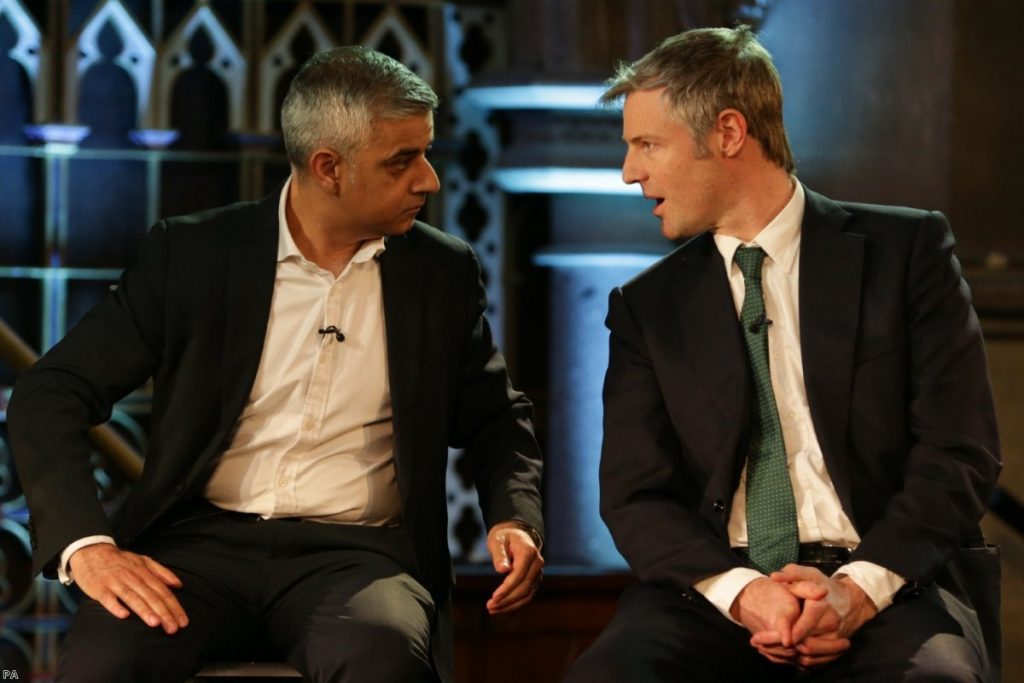Bookies suggest that Sadiq Khan has a more than 90% chance of becoming the next London mayor, while pollsters estimate he has a lead of anything between 10 and 20 percentage points over his Conservative rival, once second preferences are taken into account.
Were Khan to lose now it would be a shock beyond anything seen at last year's general election, where the polls at least suggested the two parties were neck-and-neck. And yet if you speak to senior people in the party you can detect a real nervousness about the result.
"I don't believe the polls," one source close to Khan told me. "I think we're ahead but not by anything like what they suggest."
Labour's pessimism is partly based on what activists are telling them. Whatever Khan may say publicly, The Tories' relentlessly negative campaign, in which he has been accused of "giving cover" to Islamic extremists, has rattled the party.


Labour sources admit privately that the attacks have had an impact on the doorstep, particularly in outer London.
"It is having an effect in the suburbs, even if that isn't translating to the polls we're seeing," one senior source told me.
One outer London Labour councillor who has been out campaigning for Khan every weekend confirms that the attacks are getting through.
"I've been getting a really good reaction up until the last couple of weeks where I've noticed some resistance for the first time. People don't want to come out and say what they're thinking but there's an awkwardness when I talk to them about Sadiq. I think the Tory campaign is just starting to have an effect."
Much of the nervousness is a hangover from last year when both the polls and bookies also predicted a Labour government, only for their hopes to be crushed on polling day.

Back then, weeks of warnings about a possible deal between 'Red Ed' and the SNP finally broke through to voters. Many Labour staffers and activists are haunted by the idea that something similar could happen again.
The fears are increased by the parallels between the two campaigns. Last year Lynton Crosby helped an Eton-educated, extremely wealthy Tory run a relentlessly negative campaign against an uninspiring Labour leader. Like now, the campaign was roundly criticised at the time as lacklustre, but it ultimately proved to be brutally effective.
Interestingly, back then bookies also rated the chances of an outright Tory majority as just 7/1 – exactly the same as they rate Goldsmith's chances of winning now.
The big difference between the two campaigns is that few voters seem to have even noticed this one is taking place. One outer London Tory councillor I spoke to said that they were finding very few people with any interest in the race.
"We've struggled to find many people who are even aware the election is taking place, let alone who the candidates are," they tell me.
"I've knocked on doors and asked about who they will be voting for in the mayoral election and they've replied with an answer about the EU referendum. My genuine experience is that the referendum has sucked oxygen out of the room and people just aren't thinking about London."
Asked whether the Goldsmith attacks on Khan's 'extremist links' had cut through to voters, they replied: "I don't think they've even heard about them. Lots of people are concerned about housing. They're not talking about much else."

None of the leading mayoral candidates are household names
The fact that neither Khan or Goldsmith are household names has compounded the problem.
"Boris and Ken were such strong characters that people knew what they thought about them. I'm not sure Zac and Sadiq are able to get across anything much, to be honest," a Tory councillor tells me.
This lack of enthusiasm seems to effect both parties. While much has been talked about the effects of race and religion on this contest, that effect may be overstated. Some Labour activists reveal that Khan is struggling to enthuse even his fellow Muslims.
"Most of the Muslim voters I've talked to will vote for Sadiq, but they haven't warmed to him as a person," one inner London Labour councillor who has been pounding the streets for him tells me.
"I tell them: 'Well we've had the charmer, look where that got us. What we have now is someone competent, intelligent, hard-working and honest. That's enough for me.'"
This apathy about the contest is a major concern for Labour. If voters aren't bothered about the result then turnout will be low. That will inevitably help the Tories, whose voters tend to be older, wealthier and more likely to turn up to the polls.
Goldsmith's support for Brexit, which many had assumed would be a major hindrance to his campaign, could even end up helping the Tories in more Eurosceptic outer London.
"Those in favour of getting out seem much more motivated to vote, so the fact that Zac is an outer could be to our advantage," one Tory councillor told me.
Polls currently show that Goldsmith and Khan are doing about as well as their parties in London, which suggests that, for the first time since the mayoralty began, voters are sticking to party lines.
As long as that remains the case then Khan remains the overwhelming favourite to deliver a much-needed boost to his party's morale.
But for a campaign so far ahead of their rivals, there remains a distinct unease in the Labour camp about what will happen after the polls close on May 5th.









